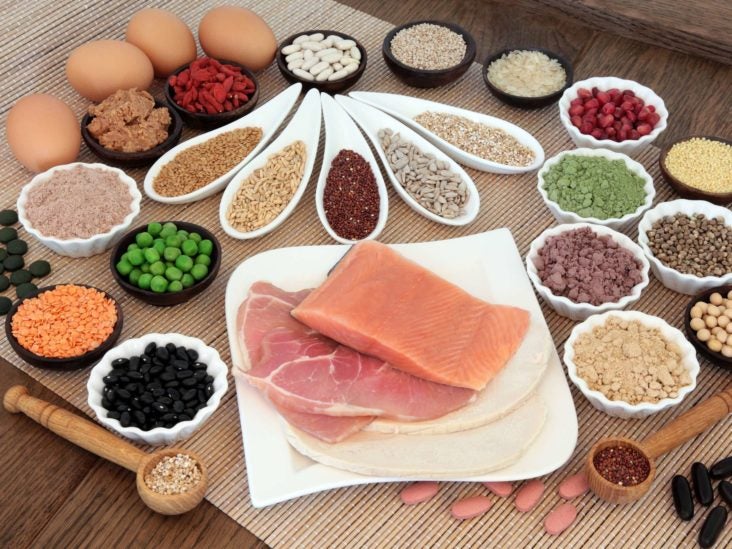Amino acids, often referred to as the building blocks of proteins, are compounds that play several critical functions in the body.
They’re necessary for vital processes like the construction of proteins and the synthesis of hormones and hormones.
Some might also be taken in supplement form for a natural approach to enhance athletic performance or enhance mood.
They’re categorized as necessary, conditionally essential or nonessential depending on several things.
This article tells you all you need to learn about essential amino acids, including the way they work, possible food sources and the advantages of choosing a nutritional supplement.

What Are Essential Amino Acids?
Amino acids are organic compounds composed of nitrogen, carbon, hydrogen and oxygen, together with a variable side chain collection.
Your body requires 20 different amino acids to grow and function properly. Though most of 20 of them are important for your health, just nine amino acids are classified as essential.
All these are histidine, isoleucine, leucine, lysine, methionine, phenylalanine, threonine, tryptophan and valine.
Unlike nonessential amino acids, essential amino acids can not be made by the human body and must be obtained through your diet.
The top sources of essential amino acids are animal proteins like meat, poultry and eggs.
When you eat protein, then it’s broken down into amino acids, which are subsequently used to assist your body with numerous processes like building muscle building and regulating immune function.
Conditionally Essential Amino Acids
There are several nonessential amino acids that are classified as conditionally essential.
These are considered to be essential only under specific circumstances such as illness or stress.
By way of instance, though arginine is considered nonessential, your system can not meet demands when fighting certain diseases like cancer.
That is why arginine has to be supplemented through diet to be able to satisfy your body’s needs in some specific situations.
SUMMARY
The nine essential amino acids can not be produced by the human body and must be obtained through your diet. Conditionally essential amino acids are just essential under particular circumstances like illness.
Their Roles Inside Your Own Body
The nine essential amino acids play a number of important and diverse jobs on your body:
- Phenylalanine: Phenylalanine is a precursor for those neurotransmitters tyrosine, dopamine, epinephrine and norepinephrine. It has an integral part in the structure and function of enzymes and proteins and the production of other amino acids.
- Valine: Valine is one of three branched-chain amino acids, meaning it’s a chain branching off to one aspect of its molecular structure. Valine helps stimulate muscle growth and regeneration and is involved in energy production.
- Threonine: Threonine is a principal part of structural proteins like collagen and elastin, which are important elements of the skin and connective tissues. Additionally, it plays a role in fat metabolism and immune function.
- Tryptophan: Though frequently associated with causing drowsiness, tryptophan has many different functions. It’s needed to keep proper nitrogen balance and can be a precursor to serotonin, a neurotransmitter that regulates your appetite, mood and sleep.
- Methionine: Methionine plays a significant role in metabolism and detoxification. It’s also essential for tissue growth and the absorption of selenium and zinc, minerals that are vital to your health.
- Leucine: Much like valine, leucine is a branched-chain amino acid that is critical for protein synthesis and muscle repair. It also helps regulate blood sugar levels, stimulates wound healing and generates growth hormones.
- Isoleucine: The last of the 3 branched-chain amino acids, isoleucine is included in muscle metabolism and is significantly concentrated in muscle tissue. It’s also important for immune function, hemoglobin manufacturing and energy regulation.
- Lysine: Lysine plays important roles in protein synthesis, hormone and enzyme production and also the absorption of calcium. It’s also critical for energy production, immune function and the production of collagen and elastin.
- Histidine: Histidine is used to produce histamine, a neurotransmitter that’s essential to immune response, digestion, sexual function and sleep-wake cycles. It is vital for maintaining the myelin sheath, a protective barrier that surrounds your nerve cells.
As you can see, essential amino acids are at the core of several vital processes.
Though amino acids are recognized for their role in muscle growth and repair, the body is dependent on them for so much more.
That’s why essential amino acid deficiencies can negatively impact your whole body including your nervous, reproductive, immune and digestive systems.
SUMMARY
All nine essential amino acids play diverse roles in the body. They are involved in important processes like tissue development, energy production, immune function and nutrient absorption.
Health Benefits of Supplementing With Essential Amino Acids
While vital amino acids can be seen in a broad selection of foods, taking concentrated doses in supplemental type has been associated with a number of health benefits.
May Help Improve Mood and Sleep
Tryptophan is needed for the production of serotonin, a compound that acts as a neurotransmitter in your body.
Serotonin is an essential regulator of mood, sleep and behaviors.
While low serotonin levels have been associated with depressed mood and sleep disturbances, many studies have demonstrated that supplementing with tryptophan can decrease symptoms of depression, boost mood and improve sleep.
A 19-day study in 60 older women found that 1 gram of tryptophan per day resulted in increased energy and enhanced enjoyment, compared to a placebo.
Could Boost Exercise Performance
The three branched-chain crucial amino acids are frequently used to relieve fatigue, improve athletic performance and stimulate muscle recovery following exercise.
In a study in 16 resistance-trained athletes, branched-chain amino acid supplements improved performance and muscle recovery and diminished muscle soreness, compared to a placebo.
A current study of eight studies found that supplementing with branched-chain amino acids has been exceptional to rest in boosting muscle healing and reducing soreness after exhaustive exercise.
Additionally, taking 4 grams of leucine per day for 12 weeks increased strength performance in untrained men, demonstrating that essential amino acids can reap non-athletes as well.
Can Avoid Muscle Loss
Muscle loss is a frequent complication of protracted illnesses and bed rest, particularly in elderly adults.
Essential amino acids have been found to reduce muscle breakdown and preserve lean body mass.
A 10-day study in 22 older adults on bed rest revealed that those who obtained 15 g of mixed key amino acids claimed muscle protein synthesis, while the process decreased by 30% in the placebo group.
Essential amino acid supplements also have been found to work in preserving lean body mass in older athletes and people.
May Boost Weight Loss
Some animal and human studies have demonstrated that branched-chain essential amino acids can be effective in stimulating fat reduction.
For example, eight-week research in 36 strength-trained men discovered that supplementing with 14 grams of branched-chain amino acids every day significantly reduced body fat percentage, compared to whey protein or a sports beverage.
A study in rats demonstrated that a diet consisting of 4 percent supplemental leucine decreased body weight and fat.
However, other research exploring the potential link between branched-chain amino acids and weight loss are inconsistent. More studies are required to decide if these amino acids may encourage weight loss.
SUMMARY
Supplementing with certain essential amino acids may help improve mood, enhance exercise performance, prevent muscle loss and encourage weight loss.
Food Resources and Recommended Intake
Since your body cannot produce essential amino acids, they need to be offered by means of your diet.
Fortunately, lots of foods are rich in essential amino acids, which makes it effortless to meet your everyday requirements.
The US recommended daily allowances per 2.2 pounds (1 kg) of body weight for the nine essential amino acids are:
- Histidine: 14 mg
- Isoleucine: 19 milligrams
- Leucine: 42 mg
- Lysine: 38 milligrams
- Methionine (+ the non-essential amino acid cysteine): 19 mg
- Phenylalanine (+ the non-essential amino acid tyrosine): 33 mg
- Threonine: 20 mg
- Tryptophan: 5 mg
- Valine: 24 mg
Foods with all nine essential amino acids are also known as absolute proteins.
Complete protein sources include:
- Meat
- Seafood
- Poultry
- Eggs
- Dairy Products
Soy, quinoa and buckwheat are plant-based foods that contain all nine essential amino acids, making them complete protein sources too.
Other plant-based sources of protein like beans and nuts are deemed incomplete since they lack one or more of the essential amino acids.
But if you’re following a plant-based diet, then you may still ensure proper intake of essential amino acids provided that you eat a variety of plant proteins each day.
By way of example, choosing an assortment of incomplete proteins like legumes, nuts, seeds, whole grains and veggies can ensure that your essential amino acid needs are met, even in the event that you choose to exclude animal products from the diet.
SUMMARY
Both animal and plant products, such as eggs, poultry, quinoa and soy, can contain all nine essential amino acids and are considered complete proteins.
The Bottom Line
There are nine essential amino acids, which you have to get through your daily diet: histidine, isoleucine, leucine, lysine, methionine, phenylalanine, threonine, tryptophan and valine.
They’re vital for functions such as protein synthesis, tissue repair and nutrient absorption.
Some may also avoid muscle loss and improve mood, sleep, athletic performance and weight loss.
Luckily, these very important compounds are found in many animal- and plant-based foods, assisting you to fulfill your everyday needs through a healthy and balanced diet.
